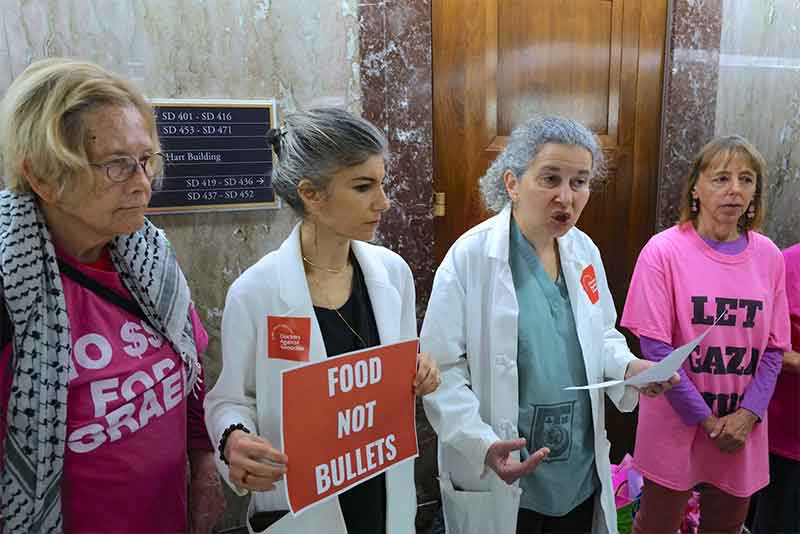Senate Global Food Security Commission Discusses Gaza Starvation

The Senate Foreign Relations Committee held a hearing March 6 on Global Food Security, a timely topic especially so with millions starving in Gaza. It was unknown if the two expert witnesses scheduled to give testimony would cover Gaza. Human rights activists were on hand to make sure the committee heard their concerns in seeking an immediate ceasefire and in providing a massive intervention of aid required to end starvation there.
The two witnesses speaking before the committee were Ms. Dina Esposito, Assistant to Administrator at the Bureau for Resilience, Environment, and Food Security, United States Agency for International Development (USAID) and Dr. Cary Fowler, Special Envoy for Global Food Security, United States Department of State.
Dr. Cary Fowler is acknowledged as the “father” of the Svalbard Global Seed Vault that UN Secretary General Ban Ki-Moon described as an “inspirational symbol of peace and food security for the entire humanity.” The vault is the world’s largest collection of biodiversity.
Prior to the doors of the hearing room being opened, the group of activists waiting in line for entry held a brief press conference where Dr. Kate Sugarman representing Doctors Against Genocide read a statement recognizing that “According to the Integrated Food Security Phase Classification (IPC) report released in December, over 90% of Gazans, approximately 2 million people, confront acute food insecurity classified at crisis level conditions or worse. This staggering statistic represents the highest number of individuals ever classified worldwide as facing severe acute food insecurity.”
She went on to observe that “…the Global Nutrition Cluster reported in February a distressing fact: one in six children under two years of age in northern Gaza suffer from wasting, the most life-threatening form of malnutrition. Shockingly, an estimated 90 percent of children under the age of five in Gaza grapple with one or more diseases due to extremely poor diets.”
Dr. Sugarman also reflected on the long-term ramifications of famine by characterizing that it is “not merely a gnawing hunger; it leaves a lasting imprint on health and economic well-being.” This bodes unwell for all those who are presently suffering and their prospects to live healthy and full lives.
Concerning the optics of the U.S. having recently dropped by air some 38,000 Meals Ready to Eat (MREs) celebrated by corporate media as a humane approach to reliving the starving of 2.3 million people, she acknowledged medically that for “Anyone who has worked on a hunger strike, we know that when a person is starving the refeeding time can be deadly. If refeeding is not done carefully people can die. Dropping meals from the sky is not the medically correct way to treat starving people.”
Julia Norman, a student working in the food security space spoke briefly acknowledging that “Even before October 7th, in Gaza 80 percent of people were reliant on humanitarian aid for their food.” This was due to the Israeli blockade that controls water, food and electricity among other goods and vital services needed in the strip. She went on to say that agricultural land has also been targeted by the IDF to disallow Gazans the ability to grow their own food.
“If this council does not talk about Gaza when 80 percent of famine is concentrated in Gaza at this moment, then it is a clear indicator that this panel is not concerned about food security. This is an intentional result of Israel’s blockade, and we need UNRWA (United Nations Relief and Works Agency for Palestine Refugees in the Near East) to be funded immediately.”
During the committee meeting, Committee Chairman Senator Cardin (D-MD) recognized that the crisis in Gaza is “…dire and getting worse. We need to get more aid to the innocent Palestinians. We need to get it to them safely and quickly.” Calling for immediate intervention, he said that “…air drops are simply not enough. Food security is a human right.”
“According to the World Food Program, 47 million people are living on the edge of famine worldwide with 333 million facing crisis levels of hunger. In recent years, food insecurity has been at its highest level since World War II.” And he warned that “When people go hungry, instability follows.”
In her opening comments, Ms. Dina Esposito referred to Gaza by informing the committee on the crisis levels of acute hunger, saying “Administrator Power who just returned from Gaza last week has continued to stress the importance of access as part of an overall sustained effort to scale up the amount of lifesaving aid, we are getting into Gaza.”
Dr. Cary Fowler spoke of “farm to fork” as an issue of food security along with the food distribution system. “The majority of countries in the world are food importers.” And that “The United States is in a unique position to lead with American values and commitment. Stating the obvious, he went on to remind everyone that “This is clearly a manmade crisis.”
Senator Van Hollen (D-MD) spoke specifically on the situation in Gaza saying, “The president and vice president spoke to the need of the Netanyahu government to allow more aid into Gaza.” He then pointed out that “Four out of five of the hungriest people in the world today live in Gaza.” And that “We also have recently passed the grim threshold of starvation, but now over 15 kids have died. Children in Gaza are being starved at the fastest rate the world has ever seen.”
Report and photo by Phil Pasquini


No comments:
Post a Comment
Note: Only a member of this blog may post a comment.